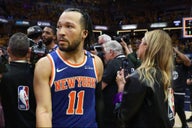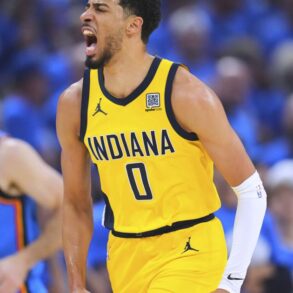The New York City Democratic mayoral candidates have entered the Tom Thibodeau discourse.
During Wednesday’s debate, each candidate had to pick a side on the thumbs up/thumbs down binary about the New York Knicks’ decision to fire Thibodeau following their Eastern Conference finals defeat to the Indiana Pacers. Seven candidates did not agree with the Knicks’ move, while Michael Blake had the backs of James Dolan and Leon Rose.
“Our goal is to win the finals, not to get to the conference finals,” Blake said.
they asked the nyc mayoral candidates what they thought about the thibs firing
greatest city in the world
— claire de lune (@ClaireMPLS) June 5, 2025
Regardless, the majority opinion on the stage seems to be the majority opinion in the greater sports world — or at least the initial majority opinion. Thibodeau just got the Knicks to the precipice of the NBA Finals and they were one of the last four teams standing for the first time in 25 years. These were not the lovey-dovey “Nova Knicks” of a year ago, thanks, in part, to the franchise-altering Karl-Anthony Towns trade that went down as training camp started. But the Knicks navigated it more successfully than not: 51 wins, the Eastern Conference’s third seed, two playoff series wins, including one over the defending champions (a series they had control of before Jayson Tatum’s injury) and a coin-flip conference final that might have gone the other way had the Knicks not blown Game 1 in historic fashion.

GO DEEPER
The Knicks’ season comes to an end, and Game 1 will haunt them for a while
On merit, Thibodeau should still be there. And what are sports if not an area of society in which we look for merit to win out in the end? There are enough aspects of life that aren’t determined by the concept of what’s deserved; sports are supposed to run counter to that. It is a deeply held value of many sports fans.
“When I first saw it,” Pacers coach Rick Carlisle said about Thibodeau’s firing on Wednesday, “I thought it was one of those fake AI things.”
Except, merit can have different meanings. We’ve heard that sports are a results-oriented business long enough that we usually believe it, but results are at once more complicated and simpler than ever before. Evidence for the latter: Blake’s comment — or, RINGZ culture, as some derisively put it. If winning a title is all that matters, and you believe you are a title contender, then the NBA becomes a zero-sum game in which only one team can be happy. If a team doesn’t win when it thinks it should, there is a hunt for reasoning. And if Thibodeau did not bring together a divided locker room, as was reported in The Athletic, did not maximize the skills of his team, as was evidenced by the team’s offensive struggles throughout the playoffs, and failed to extend his rotation until it was too late, why should he be back?
Advertisement
Another value sports fans hold dear: the importance of organizational alignment, from ownership to management to the coaching staff to players (and beyond). If management doesn’t believe in the coaches, or the players don’t believe in management, everything disintegrates. Right?
Well, if you believe that is a prerequisite for winning a title, let me point you to a little-known documentary called “The Last Dance.” Also, let’s go back to the surprise firings (in timing, if not in eventuality) of Denver Nuggets coach Michael Malone and general manager Calvin Booth from the last week of the regular season.
More so than in the Knicks situation, there was a clear conflict between those two values. Malone coached the Nuggets to their first championship just two seasons ago. To fire him so soon after a title (Nick Nurse, Frank Vogel and Mike Budenholzer have also lost their jobs shortly after winning championships in the last four years) seemed like an abandonment of merit.
Yet, there was an equal case to make that the Nuggets’ decision was overdue. Malone and Booth had been feuding long before their dismissals, causing fractures within the Nuggets. Despite Malone guiding the Nuggets to seasons of 57 and 50 wins (with David Adelman doing relief work in the latter year), ownership still held him accountable for not doing more to guarantee organizational harmony. At least in Malone’s case, he had company in the blame department.
The rub, of course, is that this had been a lingering issue, not a sudden one. Management and the coaching staff had disagreements leading up to the championship, but the Nuggets were able to overcome them. Everyone looks happy during a parade, but that doesn’t mean there aren’t simmering, perhaps unfixable, issues. (The issues worsened in the year following the title.)
Advertisement
Imagine if the Nuggets had fired Malone and/or Booth after last season, in which they lost Game 7 of the second round at home. Or if the Knicks had followed the lead of the Nuggets and Grizzlies by firing their long-time coach before the playoffs arrived. It’s not like they were a happy team as the season played out, nor were they significantly outperforming expectations. If you’re looking for a reason to change, you can always create one.
There is a straightforward reason for all these firings: competitive windows are closing faster than before. Player contracts are shorter, restraints on team-building in the new CBA are tighter and win-or-else angst is at an all-time high. There is less time to find the perfect recipe than there used to be. If you think you have a roster that can win, you better make sure you have the right leadership in place.
The question isn’t whether these firings are right or wrong, but why it feels like they can be both right and wrong simultaneously. It’s not that “deserve’s got nothing to do with it,” to borrow a phrase from”Unforgiven.” It’s that it has never been harder to determine what “deserve” means when it comes to leading an NBA team.
(Photo: Maddie Meyer / Getty Images)
This post was originally published on this site be sure to check out more of their content.







